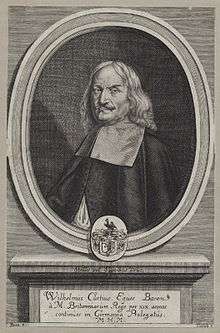Curtius baronets
The Curtius Baronetcy of Sweden was a title in the Baronetage of England,[1] created on 2 April 1652 for William Curtius, "Resident to the King of Sweden".[2]

Curtius was a diplomat representing the House of Stuart during the Thirty Years' War and the exile of Charles II, and head magistrate for two of the Electoral Palatinate districts for many years. [3] [4] Curtius was elected as a Fellow of the Royal Society in 1667,[5] and was England's Resident Ambassador to the Holy Roman Empire from 1664 until 1677.
The second baronet was Karl Wilhelm (Charles William); his son Carl August Adolf von Curti was the third.
The baronetcy became extinct in 1823 with the death of the fourth baronet, Wilhelm Adam. The Curti-Schloss was inherited by Julianne von Curti, and then by her children of her marriage into the Von Gall family.
Curtius Baronets, of Sweden

- William Curtius FRS, 1st Baronet (Born Johann Wilhelm di Curti on 12 August 1599 in Bensheim, died 23 January 1678 in Frankfurt am Main).[4][6]
- Charles (William) Curtius, 2nd Baronet (26 December 1654 – 13 April or September 1733)[6]
- Herman Carl (Charles) August Adolf Curtius, 3rd Baronet (22 April 1699, married 15 March 1740, 18. August 1753)[7]
- Wilhelm Adam von Curti, 4th Baronet (21 July 1742 - 15 January 1823).[6]
On his death in 1678, Sir William was succeeded as Baronet by his son, Sir Charles William Curtius (Carl von Curti), who lived until 1733. Sir Carl was also appointed as Oberamtmann of Umstadt, from 1681 to 1691.
Sir Charles petitioned the English Parliament to pay the substantial fees promised Sir William by "Kings Charles the First, and Second". The petition sought "for a Debt incurred upon the Account of Publick Service by his Father Sir Wm. Curtius, that to the Amount of Fourteen thousand Two hundred Fifty-five Pounds, as appears by the Accompt signed by his late Majesty King Charles the Second; who was pleased to grant him a Privy Seal for Two thousand Pounds; but only Five hundred Pounds, Part thereof, was paid." [9] The petition was unsuccessful.
Since 1785, the church in the village of Wald-Amorbach, Breuberg has rung its bells at 10am daily in the "Curti-Peal" for the salvation of the von Curti family. The peal was established by Carl August Adolf von Curti's widow, Erhardine Catharina Louise von Wahl (* around 1700, † 17. Februar 1786), when she gave the Curti forest to Gross-Umstadt.[7]
Wilhelm Adam von Curti was declared bankrupt in 1790. His estate at that time included feudal leases ("lehen") in six towns: Groß-Karben, Klein-Karben, Kaichen, Kloppenheim, Burggräfenrode and Dortelweil, Kurpfalz.[10]
The baronetcy became extinct in 1823 with the death of Wilhelm Adam, the last male descendant.
| Baronetage of England | ||
|---|---|---|
| Preceded by New creation |
Curtius Baronetcy, of Sweden 1652–1678 |
Succeeded by Sir Carl William Curtius |
References
- Heyleyn, Peter (1773), Help to English History: Containing a Succession of All the Kings of England ... the Kings and Princes of Wales; the Kings and Lords of Man: and the Isle of Wight. As Also of All the Dukes, Marquises, Earls and Bishops Thereof ... Together with the Names and Ranks of the Viscounts, Barons, and Baronets, of England, p. 475
- Cokayne, George E. (1900), Complete Baronetage, Exeter: W. Pollard & co., ltd.
- Widder, Johann Goswin (1 January 1787). Versuch einer vollständigen geographisch-historischen Beschreibung der kurfürstl. Pfalz am Rheine. Band 2. (A geographic history of the Palatine Electorate, volume 2). Frankfurt und Leipzig: Dritter Zheil. p. 4. Retrieved 25 August 2015.
- Wilhelm von Curti, Biography of Hesse, at: Landesgeschichtliches Informationssystem Hessen (LAGIS) in Germany
- "Fellowship of the Royal Society".
- Curti Castle (de)
- "Stadtarchiv Breuberg: Curti-Waldkauf-Originalurkunde von 1785 entdeckt". Archived from the original on 26 November 2015. Retrieved 17 January 2015.
- "A short history". The Standing Council of the Baronetage. Archived from the original on 20 September 2015. Retrieved 21 November 2015.
- "House of Commons Journal Volume 10: 3 August 1689". Journal of the House of Commons. 10 (1688–1693): 251–252. 1802.
- "Leonhardi, Johann Peter Freiherr von, in: Hessische Biografie". 10 September 2013.